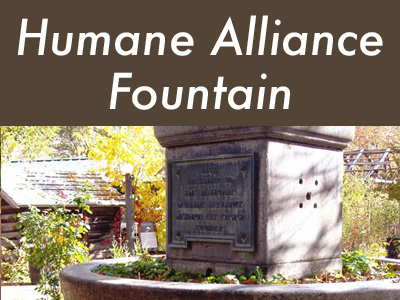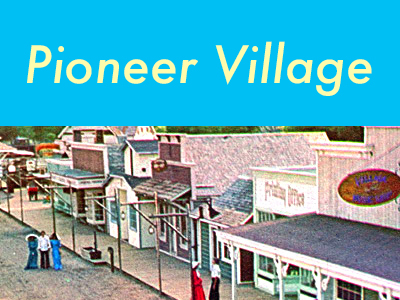Originally Built: ca. 1870
Original Location: Rockport, Utah
Current Location: Brigham Street, Pioneer Village

The town of Rockport, Utah was first settled under the name Crandall in 1860. It joined other early settlements such as Wanship to the north and Peoa to the South and was situated on the original route of the Overland Stage. The name was changed to Enoch City the following year. In 1866, the Blackhawk War caused the town’s residents to evacuate to Wanship. When they returned the next year and built a rock fort, the town’s name changed again to Rockport.

This one-room, 18-foot-by-28-foot schoolhouse was built around 1870. It was constructed of rough-hewn pine logs with a floor made of flat rocks. It was Rockport’s first public building and was also used for church services and community events. The book Echoes Of Yesterday states, “For the dances, a chair was placed on a small table. This was the orchestra stand for the lone fiddler (Henry Walker) who came from Provo Canyon to furnish music for the dances.”
A superintendent’s visit to the school in November 1875 was reported in The Salt Lake Daily Herald:
“They have a neat little school house and 47 children in Rockport, and kept their school in session six months during the past year. The trustees and people appear to be interested in the welfare of their children.”


In 1892, residents could finally afford to build a new church and social hall. The school was moved a few yards away and the new church was built in its place. The log school remained in use until a new brick schoolhouse was constructed some time before 1912. The old log school was moved a short distance away and became the Relief Society Building.


There were 27 families living in the Rockport area in the mid-1950s when the U.S. Bureau of Reclamation purchased the land to build the Wanship Dam. Those residents relocated elsewhere in the valley or moved out of the state.
Some buildings were torn down and others were salvaged. The social hall built in 1892 was relocated to a safe spot above the dam. It was used to store equipment for many years, but has now been renovated for use as a reception center.
Some of the buildings ended up in the Pioneer Village collection in Salt Lake City. Around 1954, the reclamation project engineer and attorney were trying to discern what properties were valuable enough to hold onto. They offered the original log schoolhouse to the Sons Of Utah Pioneers for their Pioneer Village museum. The S.U.P. then took the chance to add an old Rockport store to their collection as well.

Also saved by the S.U.P. was a two-story log cabin from Wanship and a home originally built by Alma Gibbons. The former Rockport town site was buried under the Rockport Reservoir after the dam was completed in 1966 and the area became known as Rockport State Park.

In 1975, the majority of the buildings and artifacts at Pioneer Village were transported to Lagoon where they have remained since 1976.
The Rockport Schoolhouse continues to educate people, not in reading, writing and arithmetic, but in history. As the sign out front states:
“It is a fine example from the middle and late 1800s of schools located in the outlying communities. The children studied by kerosene lamps and huddled around the pot-bellied stove in the cold weather.”

The bell tower that was once placed on the front of the roof has recently been removed for some unknown reason. It may or may not have been an original part of the structure.

From 2015 to 2019, the schoolhouse was part of the Pioneer Village Scare Zone, a walk-through attraction encompassing the north portion of Pioneer Village during Frightmares. Each fall, guests who entered the school would find a decomposing school teacher and a classroom full of creepy dolls.


MORE LAGOON HISTORY

REFERENCES
Summit County: The Educational Prospects There. The Salt Lake Daily Herald, 17 Nov 1875.
Daughters of Utah Pioneers of Summit County. Echoes Of Yesterday: Summit County Centennial History. 1947.
Meeting house, 90, restored for S.U.P. museum. Sugar House Bulletin, 28 Jan 1955.
Brown, Thomas E. Rockport Utah: A Brief History and Photographs of Homes. [PDF] RockportOriginals.com, 27 Jan 2002.





Leave a Reply